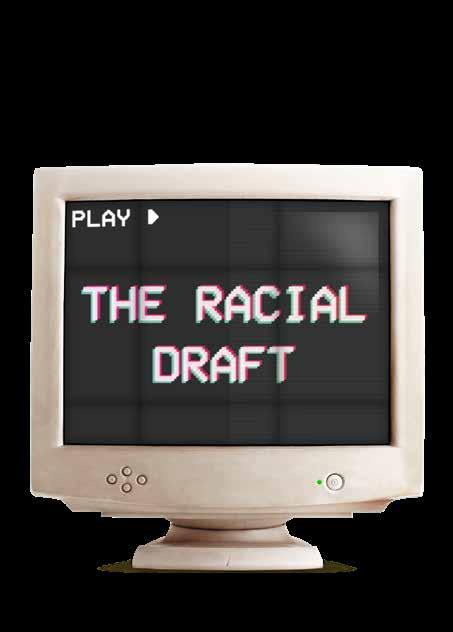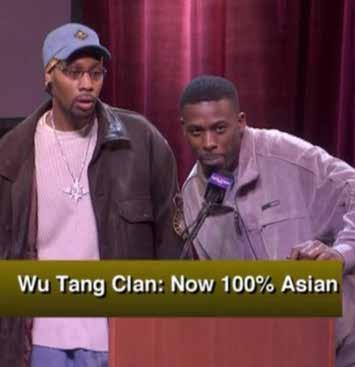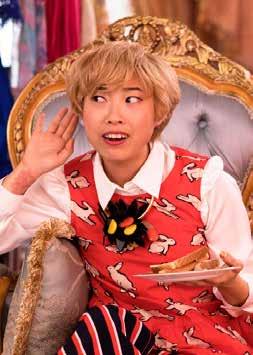
4 minute read
THE RACIAL DRAFT

Advertisement
As bored as I’ve been this quarantine, I’ve started to take some time to really dig into the music I like, starting with Wu Tang Clan. Filing through liner notes and producer credits, I started running through their first album, 36 Chambers. When Wu Tang Clan “Ain’t Nuthin Ta Fuck Wit” came on, the vocal sample that opens the record (a man growling ‘tiger style’) gave me quick pause; when I looked it up it was pulled from a classic kung-fu movie (where else!). The Wu’s catalog is littered

with samples and influences pulled from Chinese and Japanese cinema, as is their name. Dave Chapelle made light of this patronage in a comedic sketch, “The Racial Draft”: different races redraft famous people with an affiliation to their culture into their delegation, and Wu-Tang gets scooped by the Asian delegation claiming the RZA and the GZA as members their own. In the eyes of the Wu, they were paying utmost respect to the medium and culture which influenced their rhyme style and frenetic energy. Their body of work has largely been appreciated as such a tribute within both Black and Asian audiences.
There’s a certain fascination these communities have with one another, distinct cultures tinged with flare co-mingling in the metropolises of the United States. Efforts to lift/borrow from one another have had varying amounts of success and equally varying qualities of cringe. DJ Q-bert (hailing from the Phillipines by way of San Francisco) rocked some of the greatest parties Uptown and in the Bronx; twenty years later, possibly the most egregious cultural interloper (Mr. Drake Aubrey Graham) moans out soliloquies and shouts out

all his Asian girls (which he follows with “let the lights dim sum”); Awkwafina made a name for herself off of a contrived blaccent and a general bastardization of urban culture to thrive within the “sassy colored sidekick” trope. Even compositionally, sampling of stereotypically oriental sounds to give a song an “exotic” feel has been perpetuated by Pharrell and Timabaland alike, and K-Pop artists pull dances and entire records from ringtone rap. Notably, Chicken Noodle Soup by J-Hope (from Korea), which borrows the beat, name and dance from Chicken Noodle Soup by Webstar and Young B (from Harlem), has 11 times the views and 25 times the streams as the original record.
By virtue of being in-tune with rap/hip-hop and being Black, I’m more attuned to and critical of perceived slights from cultural borrowing. It always feels shitty when someone romanticizes/ ghettoizes your culture to project for themselves a different life (or to create for themselves a cash cow). Some of this stems from racial triangulation, a concept developed by political scientist Claire Jean Kim: while Asians have been held as a model minority and enjoy an adjacency to whiteness (described as “valorization” to subordinate both Blacks and Asians), they are also held in a permanent alien status. They are always foreign. In contrast, Black people are irrevocably American by virtue of slavery and oppression (which is not to say White people haven’t tried to revoke this status). Black people feel exploited by Asians when Asians use Black culture as an inroads to American-ness, while Asians feel exoticized when Black people borrow from them.

All the same, it’s important to recognize an additional context for the acculturation: hip hop is at its core about irreverence, flipping/sampling literally anything to give a record a different feeling or that new soul, and disrespect is hardly meant by ignorant references and interpolations. On the flip side of that, with seemingly limited space in media for narratives and character types, it can become attractive for someone like Awkwafina to try to slide into a pre-existing slot (sassy sidekick, hood hero, etc.) which just so happens to come from a typecast which unfairly represents Black people and is more acceptable from a lighter, pseudo-white face.
The sinister undertones of appropriation reside in the reality of co-opted culture being used to the detriment of its people. As Kenyon Farrow, queer black writer and activist, puts it, the question is: “If first-generation white European immigrants like Al Jolson could use minstrelsy (wearing blackface, singing Black popular music and mimicking their idea of Black people) to not only ensure their status as white people, but also to distance themselves from Black people, can Asian Americans use hip-hop (the music, clothing, language and gestures, sans charcoal makeup), and everything it signifies to also assert their dominance over Black bodies, rather than their allegiance to Black liberation?” Reconciliation means recognizing cultural affronts, unintended or otherwise, and communicating discomfort. Reconciliation means paying mind to the potentially exploitative nature of uncredited borrowing in media where we don’t all have the same cultural capital. But also: sometimes shit is just corny.





